Subtotal: $
Checkout-

The Teacher Who Never Spoke
-

Bonhoeffer in China
-

The Comandante and the King
-

Confronted by Dorothy
-

Insights on Courage
-

The Art of Courage
-

Why We Hope
-

Harlem Postcards
-

T. S. Eliot’s “Little Gidding”
-

The Need of Refugees
-

Listening to Silence
-

Editors’ Picks Issue 12
-

The Happy Nuns
-

Traudl Wallbrecher
-

The Man Who Welcomed Immigrants
-

The Soil of Friendship
-

Thomas Müntzer
-

A Time for Courage
-

“What is Truth?”
-

Readers Respond Issue 12
-

At the March For Life
-

Why the Death Penalty Must Die

Next Article:
Explore Other Articles:
This article was originally posted on March 24, 2017.
Detective Steven McDonald of the New York City Police Department, who died January 10, was shot in the line of duty in 1986 and paralyzed from the neck down. Confined to a wheelchair and dependent on a ventilator to breathe, he forgave his teenage assailant.
I first met Steven McDonald in the studio of a national TV talk show. The night before, a young black man, Malcolm Ferguson, had been shot and killed by police in the Bronx after protesting the acquittal of four police officers in the shooting death of unarmed immigrant Amadou Diallo in the same neighborhood. Tensions between police and the black community had skyrocketed. Could anyone bridge that chasm or at least close the distance? Or would a third-generation Irish-Catholic NYPD officer who had been shot point-blank by a black teenager pour gas on the fire?
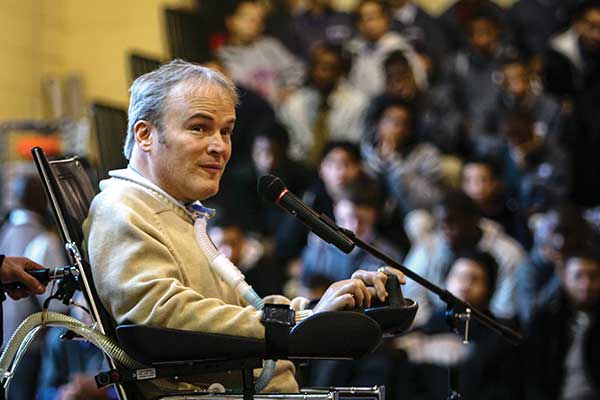
Steven McDonald addressing high school students in the Bronx in 2006. Photo by Anthony DelMundo for New York Daily News.
I needn’t have worried. McDonald was there to promote a new book, Why Forgive?, in which his friend, Bruderhof pastor Johann Christoph Arnold, tells McDonald’s story. Joining him was Roberto Rodriguez, a victim of police brutality in Los Angeles who is also featured in Why Forgive? Radiating peace as they calmly recounted their stories, the two men acknowledged the need for justice but offered a more radical prescription for the healing of individual souls and entire cities: forgiveness and prayer.
Speaking in bursts between the puffs of his breathing machine, McDonald said, “Many people of different races and different religions were praying for me to live when I was dying, which I was. And when I was told that I would be completely disabled, they prayed that I would recover my abilities. I believe God answered that prayer in giving me the faith and love to forgive the young man who shot me.”
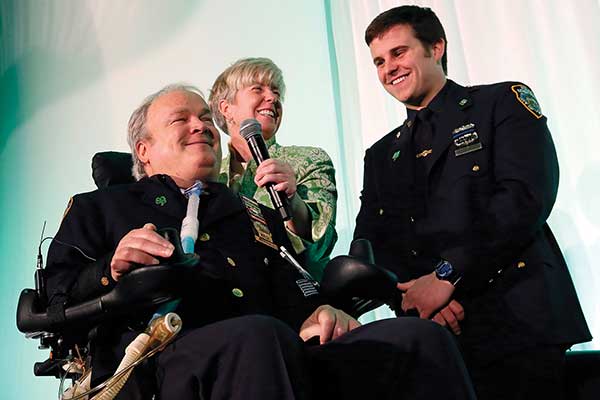
Steven McDonald, his wife Patti Ann, and son Conor in March 2015. Photograph by Stuart Ramson / AP Images.
On July 12, 1986, McDonald, a twenty-nine-year-old police officer on patrol in Central Park, stopped to question three teenagers about a recent bicycle theft. The oldest, a fifteen-year-old, took out a gun and shot him in the head, neck, and arm. McDonald was rushed to a hospital, where surgeons told his wife that he would be paralyzed from the neck down for the rest of his life. He later wrote:
Already a subscriber? Sign in
Try 3 months of unlimited access. Start your FREE TRIAL today. Cancel anytime.
My wife, twenty-three years old, was three months pregnant. Patti Ann was crying uncontrollably at the cards she had been dealt, and I cried too. I was locked in my body, unable to speak, move, or reach out to her.
A week after I was shot, the media asked to speak to my wife. Though still in shock, Patti Ann bravely told everybody that she would trust God to do what was best for her family. That set the tone not only for my recovery but also for the rest of our lives.
McDonald spent the next eighteen months in hospital. Six months after the shooting, Patti Ann gave birth to their son, Conor. At Conor’s baptism, McDonald publicly forgave Shavod Jones, the teen who had shot him.
I wanted to free myself of all the negative, destructive emotions that this act of violence awoke in me – the anger, the bitterness, the hatred. I needed to free myself of those so I could be free to love my wife and our child and those around us. I often tell people that the only thing worse than a bullet in my spine would have been to nurture revenge in my heart. Such an attitude would have extended my tragic injury into my soul, hurting my wife, son, and others even more. It is bad enough that the physical effects are permanent, but at least I can choose to prevent spiritual injury.
A year or two later, Jones called the McDonalds from prison and apologized. McDonald hoped that someday the two of them could travel the country together, sharing the story of the terrible day that changed the course of both their lives. In 1995, Jones was released from prison. Three days later he died in a motorcycle accident. But as McDonald would often say, “Shavod Jones is with me wherever my story is told. We have helped many people, the two of us.”
I know it may be hard to understand, but I would rather be like this and feel the way I do, than go on living like I was before. Of course, I have my ups and downs. Some days, when I am not feeling well, I get angry. I get depressed. There have been times when I even felt like killing myself. But I have come to realize that anger is a wasted emotion. So I forgive that young man all over again, and every time I tell my story, I think of Shavod, and I forgive him.
Months and years have come and gone, and I’ve never regretted forgiving Shavod. Back then we never imagined it would carry any importance in other people’s lives. We did it for ourselves. But ever since, people have wanted to hear about this act of forgiveness. It helped us, but more importantly it has helped others as well.
In the wake of the Columbine High School shooting in 1999, McDonald and Arnold joined forces to launch a program called Breaking the Cycle, bringing a message of nonviolent conflict resolution through forgiveness to assemblies at New York–area schools.
I’ve been able to reach out to children in particular, because it was a child of my city that did this terrible thing to me. I have spoken at hundreds of schools about nonviolence, and I know from responses I get that many of the children have embraced my message and internalized it. Instead of responding to violence with more violence they have decided to choose forgiveness and love. So God has turned something terrible into something beautiful.
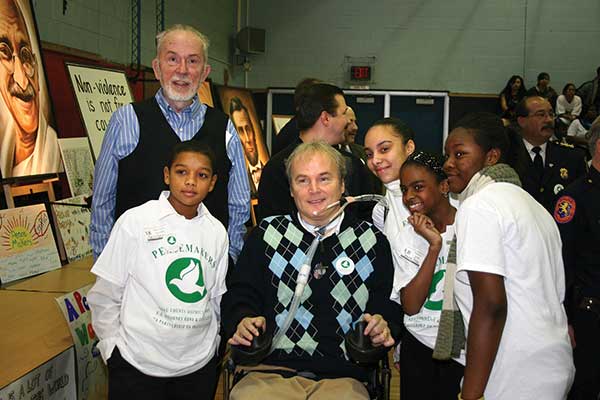
Johann Christoph Arnold, Steven McDonald, and students from Lawrence Road Middle School, New York, in 2008. Photograph courtesy of Breaking the Cycle.
A quintessential Irishman and Catholic, McDonald asked Arnold, a Protestant, to help him bring their message of healing through forgiveness to Northern Ireland. The Good Friday Agreement had recently been effected, ending decades of open conflict, but the wounds were still raw and deep. With “marching season” tensions simmering and police in armored vehicles and riot gear standing by, the two men accompanied a children’s chorus up Garvaghy Road and through other volatile neighborhoods, prayed together in Protestant and Catholic churches, listened to victims of violence on both sides, and addressed members of Parliament at Stormont.
Accompanying them was Franciscan priest Mychal Judge, the New York Fire Department chaplain who would become the first recorded fatality at the World Trade Center on September 11, 2001, where he had gone to minister to the wounded. That day scuttled the three men’s plans to bring their work for reconciliation to the Middle East. Four years later McDonald and Arnold made the trip, meeting with Jewish and Palestinian bereaved parents, police, and human rights activists.
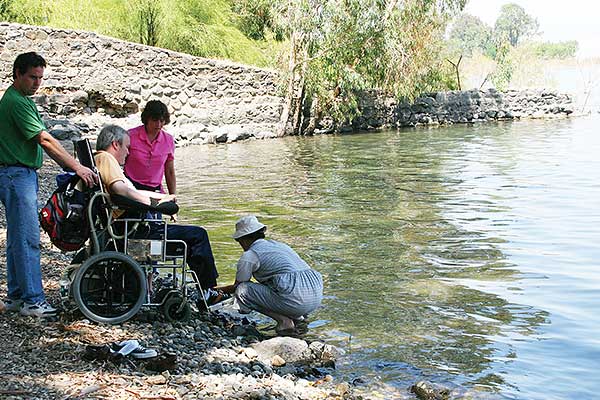
In 2005, McDonald brought his message of forgiveness to the Holy Land. Visiting the Sea of Galilee, he asked his caregivers to remove his shoes and place his feet in the water. Photograph courtesy of the McDonald family.
World leaders, celebrities, and millions of ordinary people have drawn inspiration from the McDonalds’ story. And who can deny that it was their witness to faithfulness in marriage, come what may, that so stirred and challenged us? Last December, Patti Ann, now the mayor of Malverne, New York, joined Steven on stage at a school assembly. Looking back over their thirty-one years of marriage, she told the students, “We were married eight months when Steven was shot. People ask me if I was to do it all over again, would I do it, and I say yes. I would do it again even if I knew what was going to happen.” Steven responded, “I’m very blessed to have had this time with Patti Ann. I think I never understood or appreciated how beautiful, wonderful, and great an experience it would be to share a life with someone else. It’s been life-giving without any end. Without Patti Ann in my life, I wouldn’t be here today, I wouldn’t be speaking on these very important issues, I wouldn’t be alive.”
Steven McDonald’s life ended on January 10, four days after a heart attack left him in a coma. Thousands of New Yorkers packed Saint Patrick’s Cathedral and the streets outside to pay their respects at his funeral Mass, which Timothy Cardinal Dolan officiated. Mayor Bill de Blasio said McDonald showed us that “the work of policing is profoundly based on love and compassion for your fellow man and woman” and must be guided by Jesus’ greatest commandments: to love God and to love your neighbor as yourself. “Brothers and sisters, we all watched Steven live out these commandments. That message from the gospel governed his life, a message centuries and centuries old that he made fresh and real for us all.”
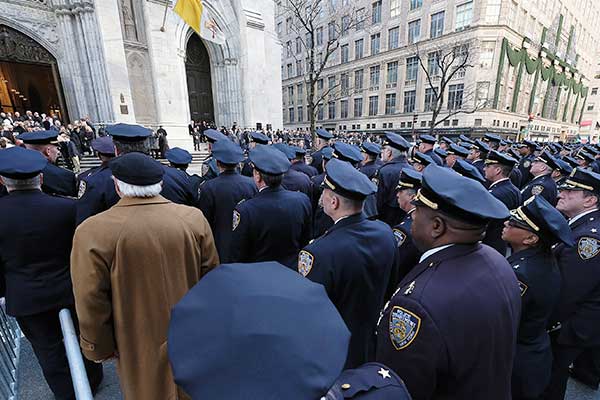
NYPD officers await McDonald’s casket outside New York’s Saint Patrick’s Cathedral on January 13, 2017. Photo by Dimitrios Kambouris / Getty Images.
Already a subscriber? Sign in
Try 3 months of unlimited access. Start your FREE TRIAL today. Cancel anytime.
Conor McDonald, now an NYPD sergeant, recounted how his father would call him every day at 5:00 a.m. while he patrolled, just to wish him a good morning, and how during his college years his father would make a weekly trip to Boston just to have lunch together at Applebee’s. “My father was always committed to me. He did more than most able-bodied fathers could ever do with their sons.… My parents created the most phenomenal life out of such darkness. It was due to their unmatched, unconditional devotion and love for each other, which I witnessed from the beginning of my life.”
At one of his last school assemblies, at the Mount Academy in Esopus, New York, Steven McDonald said:
People want to know: How did you forgive the young man who shot you? And again, looking back, pondering on my life since that time, it’s clear to me that God was in charge. All he wanted was the opportunity to use me. He just needed my yes, and that was made possible by prayer. It’s that simple, really.
Through the people, the family and friends, that God put in my life, and their prayers, God spoke to me and said, “Will you love this boy who shot you?” And the best way that I could love him was to forgive him. Left to my own abilities, I don’t think I would have done it. But it was through those around me, God speaking through them and touching me through them, that I was able to say yes. And I know that I would have died a long time ago had I not listened to God, said yes to God, followed the example of his Son, and loved and forgiven.…
Everything that I’ve experienced in the last thirty-plus years can only be from God. At first I wondered why this was happening to me, to us, and a quiet, still voice – we all know what it is: God – spoke to me. After the shooting and throughout the hours, days, months, and years that have followed, that quiet, still voice has assured me that it’s of God, from God, a blessing.
Catholics have their own criteria and process for sainthood. But as far as many a New Yorker is concerned, we can skip the formalities: McDonald is a saint for our times. He wasn’t just a hero and role model. He allowed God to work powerfully through his suffering and weakness, and everyone whose life he touched came away blessed.
Already a subscriber? Sign in
Try 3 months of unlimited access. Start your FREE TRIAL today. Cancel anytime.
































metin erdem
Johann Christoph Arnold, real man of God...God's man. He always worked for others. He believed in the peace and love of God. He helped everyone who is in need and suffering. He lived a real life ..life that lived for his family and neighborhoods. A life for God. He worked for peace and against violation. He believed in young people and children that are the gift of the God. He knew that the peace starts by smiling . He believed that we could break the cycle of the violance throug forginess. He forgave, he had mercy , he loved his enemy and he loved everything created by God. And the future would be more peaceful and happy with young people. He wrote books so everyone can get knowledge about peace , love and God. The power of the forgiveness is stronger than hate. And the fruit of the forgiveness is peace..
metin erdem
He lived a life for God and humanity. He loved God and his neighbors. He lived the peace and love of God in his heart. I could not meet him but I could feel him in my heart. May God let us all live as a Life as he lived . May he rest in peace. We will not forget him.